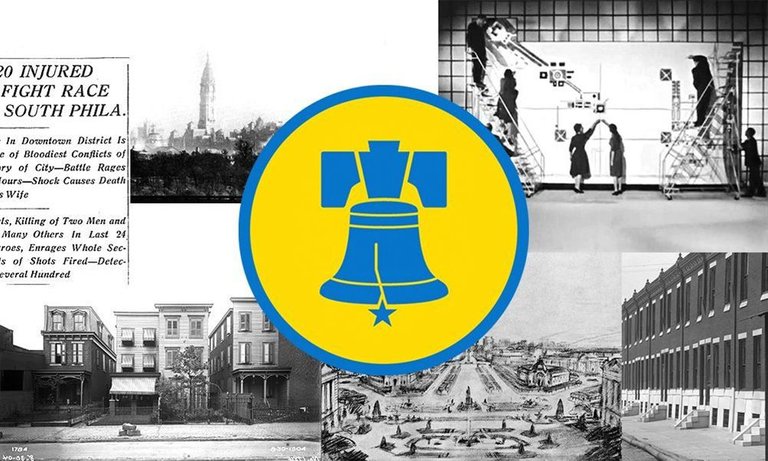As we boasted last time, the @phillyhistory project was brought to life by 15 students who, along with @phillyhistory, published 297 posts in 15 weeks drawing 872 comments and 10,647 upvotes. Thanks to @charliehersh, @cheider, @chelseareed, @connellgregg, @dduquette, @engledd, @jfeagan, @gvgktang, @hourofhistory, @johnesmithiii, @landy-yinan, @peartree4, @tmaust, @xiaonanli and @yingchen for making the project come alive.
We wanted to highlight a few notable moments.

The ones that garnered the most attention were:
109 Upvotes: Arts, Culture, and Philanthropy: The Robbed and the Robbers
New York Times announcement of a free “upcoming exhibition” on the Lower East Side that “dripped with disdain, playing up the foolishness of the gesture.” The headline read “East Side Picture Exhibition, Valuable Paintings Which Poor People May Look At,” underscoring the monetary value of the 100 paintings to be exhibited; featuring the insurance value of $150,000. “It attracted 36,095 visitors in a forty-one day run…”@cheider brought to our attention an 1892
81 Upvotes: Fair Wages, or Why Steemit Isn't Right for Cultural Institutions...Yet.
@tmaust cut loose with a provocative post that created quite a stir with 81 upvotes and 16 comments from 8 individuals totaling 2,500 words, including Steemians not enrolled in the course. (Thank you @natureofbeing, @remlaps and @hansikhouse.) “If the blockchain becomes part of mainstream life," wrote @tmaust, "of course museums should embrace it. However, it also feels like the blockchain hype is based on a fragile market... That's not a healthy market. IF cryptocurrency is ever able to support a living wage, raise money, and provide a benefit as a content management tool... it could prove to be a boon for cultural organizations. But that potentiality would come with its own ethical quandaries and we are not there now.”
79 Upvotes: 1918: Achille-Claude Debussy-- The Imaginative World Is The Only Real World
From @yingchen: Debussy’s “music was completely different from other musicians, and he didn't often use the major and minor scales used in traditional classical music. Sometimes he would go back to the quaint old tunes of the early church music. [His] favorite scale had six tones and no half-tone, so his melody was distinctive from any past music. His chords were even weirder. He built his unique "dream world" by using his favorite diatonic scale, as he said, ‘The imaginative world is the only real world’.”
59 Upvotes: 20th Century Solutions, 21st Century Problems?
@gvgktang on the Historical Society of Pennsylvania: “After a deficit was incurred in FY13, the organization was able to recoup the loss and have positive net balances in FY14 and FY15. Overall staff costs declined by 2.6% over those 3 years, but the CEO salary rose by 21.9% in the same period. … The Society hopes to maintain its current levels income and expense, including staff funding: despite rumors that it might “have to ‘go dark’ for a period of time.”
59 Upvotes: *Philadelphia History Museum(s)
Responding to a reading from the mid-1990s, A Vision for a Historical Center in Philadelphia, @charliehersh points out that “a better alternative would have been to support” what’s in place. “The article cites a fundraising goal of $50M, including a $20M endowment, and that money could instead be used to create a framework that could encompass all existing historical institutions, to make them a more cohesive network instead of disparate organizations.”
54 Upvotes: Collectors in China: Art Lover and Tricky Investor
@landy-yinan tells us that art collecting “has become a trend among Chinese second-generation rich kids” who are both wealthy and educated. They are “different from older generation Chinese collectors who lacked “knowledge of art and [were] mostly dependent on art brokers to search for investing targets.” These “young investors have passion” for the arts and are redefining the market.
50 Upvotes: The Row Home Museum: Letter of Intent
Modest Manifesto for Museums which called for micro-scale institutions. His 10th point provided both vision and guidance: “Monumental buildings that dominate neighborhoods and entire cities do not bring out our humanity; on the contrary, they quash it. Instead, we need modest museums that honor the neighborhoods and streets and the homes and shops nearby, and turn them into elements of their exhibitions.”@tmaust felt inspired by Orhan Pamuk’s s
What a ride it has been... Thanks again to everyone who posted, commented, replied and read.
Center for Public History and MLA Program, is exploring history and empowering education. Click here to learn more.100% of the SBD rewards from this #explore1918 post will support the Philadelphia History Initiative @phillyhistory. This crypto-experiment conducted by graduate courses at Temple University's

Thanks for the ingenuity @Phillyhistory. It was a pleasure to participate in such an innovative project and definitely impressive to see what can be created when a group of people work together to write history and answer difficult questions about the cultural sector.
It will be very interesting to continue to follow this account and see where the future leads.
Thanks for all of your efforts, innovations and good thoughts for the future @hourofhistory. A pleasure working with you! Good luck changing the field of public history. It needs you.
Congratulations @phillyhistory! You have completed some achievement on Steemit and have been rewarded with new badge(s) :
Click on any badge to view your own Board of Honor on SteemitBoard.
To support your work, I also upvoted your post!
For more information about SteemitBoard, click here
If you no longer want to receive notifications, reply to this comment with the word
STOPThis post has been deemed resteem & upvote worthy by @ecs community leaders @chelsea88 & @inthenow